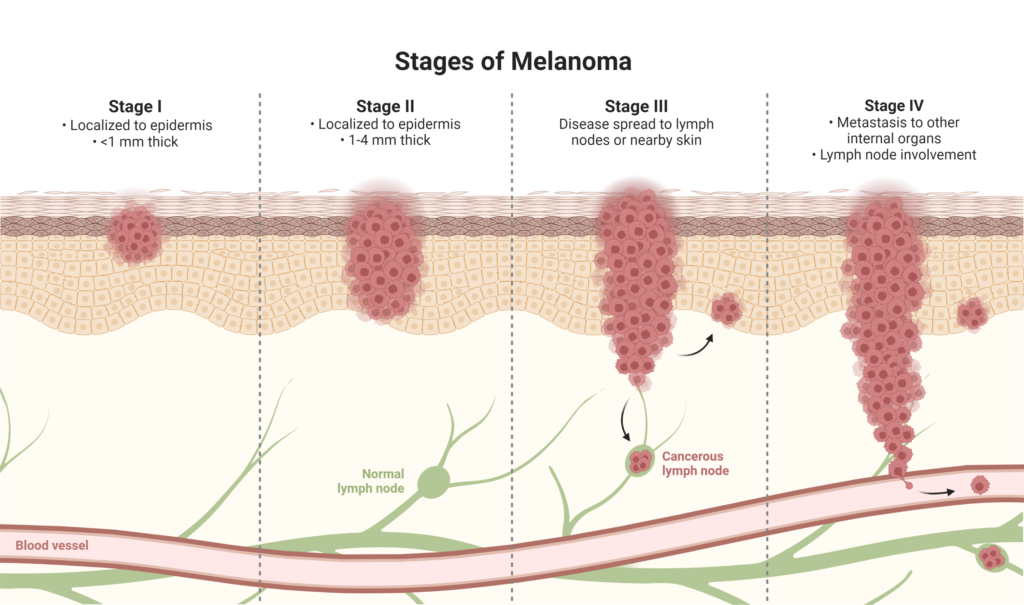For the general population, approximately 2 in 5 Americans will be diagnosed with cancer during their lifetime. Of those diagnosed, 90% will succumb to metastatic, end-stage disease.
“Metastatic cancer” is cancer that has spread from where it started to another part of the body. Metastatic cancer is much harder to treat as it has entered the bodies “highway” system, or lymphatic system to spread to other organs and areas in the body. For example, an individual does not succumb to a localized spot of melanoma on the skin. However, if the melanoma has a chance to invade deeper tissues (see image below) and enter into the bodies “highway” system and travel to distant areas, the likelihood of survival decreases from 99% to 30%.

We all know that some of the most prevalent, and relevant causes of cancer are: Sedentary lifestyle (lacking exercise), Obesity, and poor dietary choices. We know that exercise assists in the prevention of cancer occurrence and also recurrence – but why?
Clinically, it is suggested that exercise can have an “anti-tumor” effect through the regulation of the metabolic profile by increasing the body’s insulin sensitivity which assists in:
- Glucose homeostasis and balance,
- Regulating sex-steroid hormone levels,
- Activating and maintaining the immune response,
- Reducing systemic inflammation,
- And the creation (secretion) of skeletal muscle myokines that inhibit tumor growth.
To highlight this concept, a study published in Cancer Research suggests that people may be able to reduce their risk of developing metastatic cancer by regularly engaging in high-intensity aerobic exercise. They observed in mouse models that the mice who had been forced to exercise on a treadmill prior to tumor initiation had a significant reduction in metastatic cancer disease (cancer that traveled to other organs) when compared to mice that did not exercise and lived sedentary lifestyles.
With their work, the researchers identified the mechanism behind the preventive effect of exercise. They found that physical activity increases glucose consumption by internal organs, which means less energy available to the tumor.
“Simply put, exercise ‘reprograms’ our organs to require more nutrients. At the same time, the healthy organs of exercisers are more easily able to ‘outcompete’ cancer cells (specifically melanoma cells, in the case of this study) for nutrients. This leaves fewer nutrients available for the tumor to use to grow.”
– Dr. Danna Sheinboim, Department of Human Genetics and Biochemistry
This study also complements the ongoing alternative medicine approach to cancer through anti-diabetic drugs such as Metformin. This was a new concept introduced to me by a tier-one special operator in his late thirties with what seems like a treatment-resistant thymoma in his chest. He mentioned seeking alternative opinions to his cancer care, one being through CareOncology, a practice that targets cancer’s metabolic pathways through restricting energy and causing cellular starvation.
Currently there are over 50 studies in the United States reviewing the anti-neoplastic effects of Metformin and various studies over the past 20 yeas have consistently demonstrated lower incidence and mortality rates of cancer patients taking Metformin with most benefits occurring in tumors expressing the LKB1 and TSC2 gene receptors. This is an interesting concept that may complement aerobic, high-intensity exercise.
One example of this is Marine Special Operations combat veteran who battled two forms of cancer (Lymphoma and Thyroid cancers) and an autoimmune disease: Max Kutch – he went from cancer treatments to lifting literal hundred-pound rocks and competing in Strongman competitions, all while beginning medical school at Ivy League University, Dartmouth!
As for exercise, we prefer the SOFLETE All-Access mobile training app, as it has evidence-based programs, and instructional videos, and provides a wide array of workouts and schedules based on your lifestyle. The nutrition menu and dietary plans are pretty epic too!
